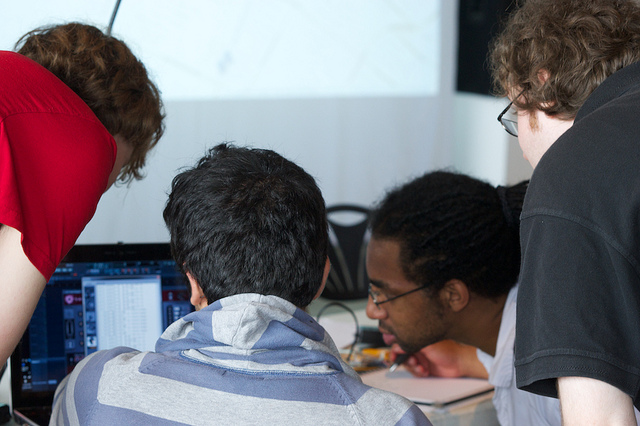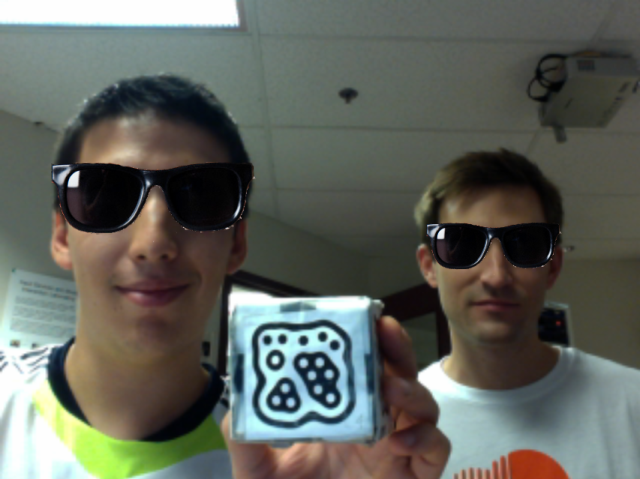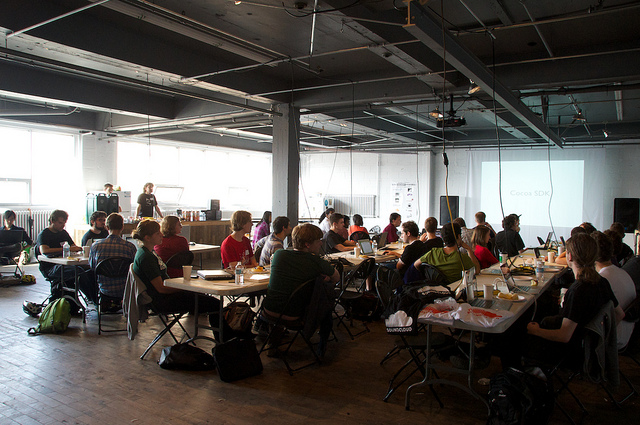
Ed.: Hacking Web databases to search sounds, remixing tools to automatically create dub tunes, cameras to sequence and analyze images in new ways, Montréal hackers have been busy. Trevor Knight writes from the event with full coverage from Canada, latest outpost of this global music coding phenomenon:
Music Hack Day made its first appearance in Canada at the end of September, painting the event with a Montréal flavour, complete with bilingualism, Montréal-style bagels, and even an appearance of Stephen Harper in a hack. Over the Saturday-Sunday event, musicians, programmers, and hackers scramble to create any sort of new music project.
With the help of dozens of laptops, gallons of coffee, several APIs and staff from such companies as The Echonest, Soundcloud, and Grooveshark, the assembled hackers churned out and presented 24 hacks in 24 hours.
Bruno Angeles took home first prize for his hack, FaCeQuencer, which uses computer vision and a webcam to control a squencer/looper and at the same time, outfit the user appropriately to the style of music.

Free Assembly, the hack from Graham Boyes, took second prize and recreates a target sound using a database of samples. It uses The Echonest Remix API for the analysis and finds target sounds sourced using Freesound.org’s API. The power of this hack was clear when Graham demonstrated using a drum and bass track as the target sound and a recording of a dog playing in water as the sample.
With a heavy presence of students and researchers from the Centre for Interdisciplinary Research in Music Media Technology (CIRMMT) and McGill University, several of the hacks incorporated data-mining. For example, David Weigl, Hannah Robertson, and Andrew Hankinson created wuzhear, a venue-based database of historical concerts in Montreal from the Montreal Jazz Festival website and last.fm’s API, including set information and playable with a Grooveshark widget.
The Wub Machine 2.0, from Peter Sobot, automatically creates Dub or Electrohouse remixes of an audio sample, while The Beatbox Machine allows one to record beatboxing and return a drum sequence replaced with actual drum samples.
For a complete list of hacks, check out http://wiki.musichackday.org/index.php?title=Montreal_2011_Hacks
Now that Canada has tasted the sweet Music Hack Day nectar, there’s already buzz for a hack day in Toronto.

Dac Chartrand (Renoise) writes with more details. Dac has his own set of hacks, but I’m excited enough about it that I’ll put that in a separate post -PK:
Other "Renoisers" were on site, but used the 24 hour session to try new ideas, but not present them. For example Steve Sinclair (Radarsat1) tried to port Mark Zadel’s Different Strokes to Android. Different Strokes resembles a freehand drawing application. The drawn strokes create animated figures whose motion is mapped to sample playback. The musician performs by assembling networks of strokes live, generating audio patterns. Steve got drawing and particles working but not enough time to hook into the Android audio subsystem, so he didn’t bother presenting.
Longtime CDM readers Studioimaginaire were also on site hacking away at their multi-touch table. They were there the full two days but also didn’t bother presenting. I tried to talk them into it several times, saying that the crowd would obviously vote for them just on cool factor alone and that they would walk away with a prize, but they stuck to their principles. Something to be said about the vibe of the event. Hackers were there to have fun.
David Viens of Plogue made am appearance for the demo session Sunday afternoon.
Good times had by all.